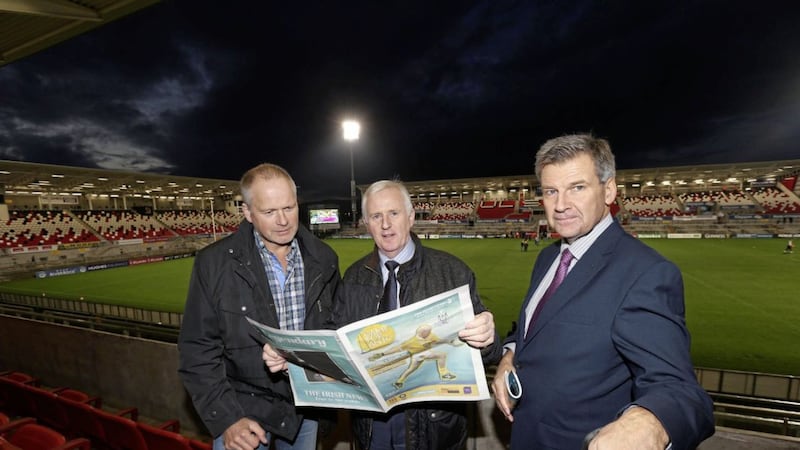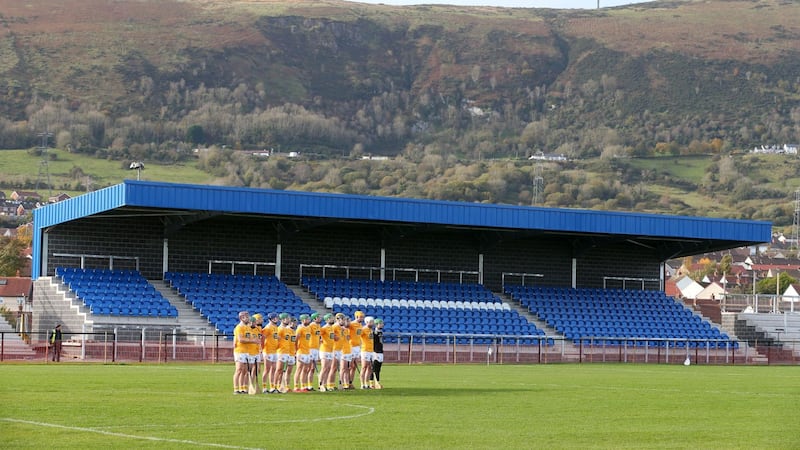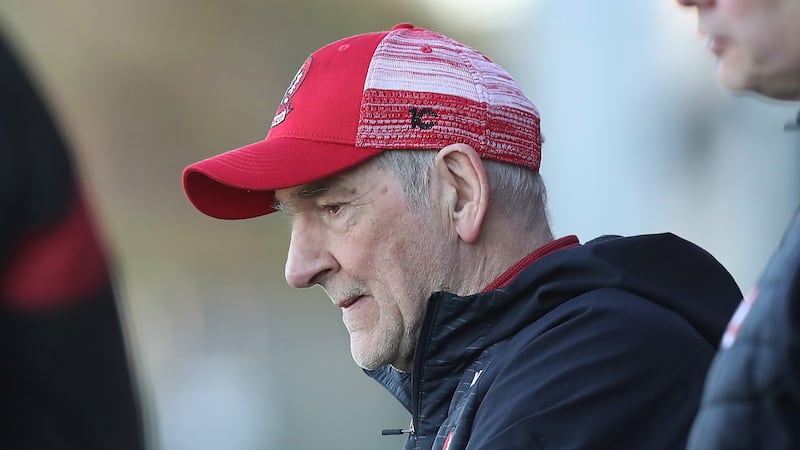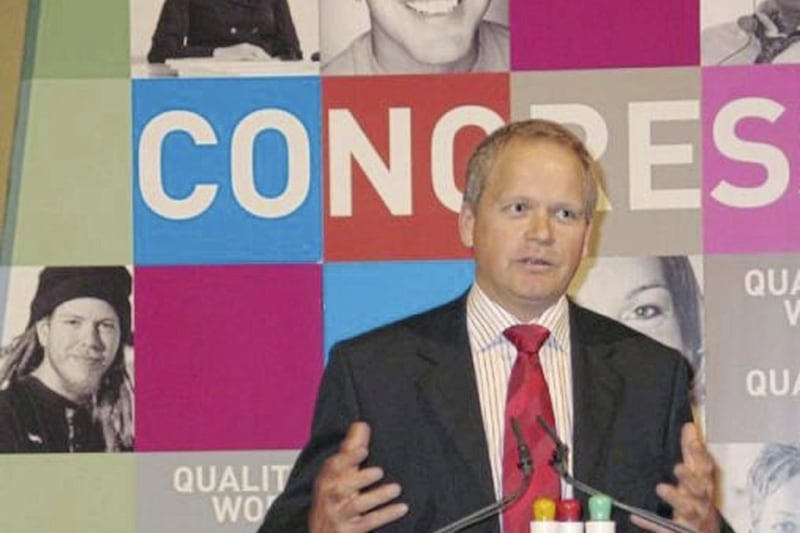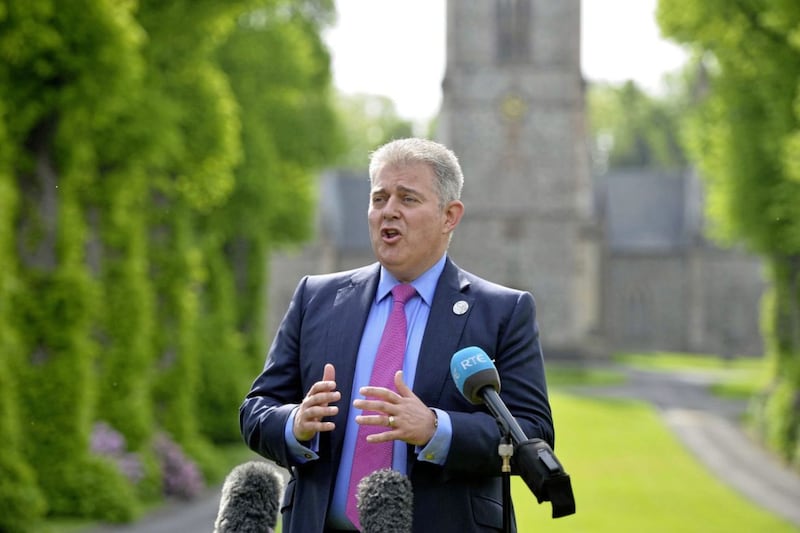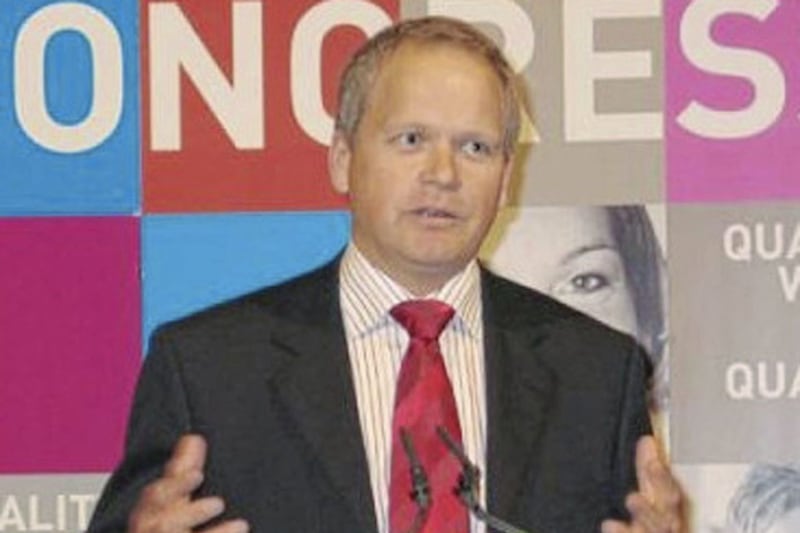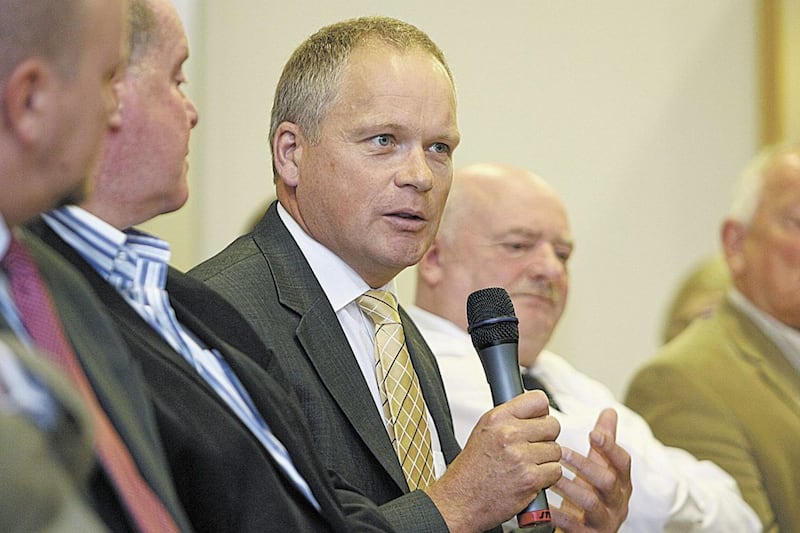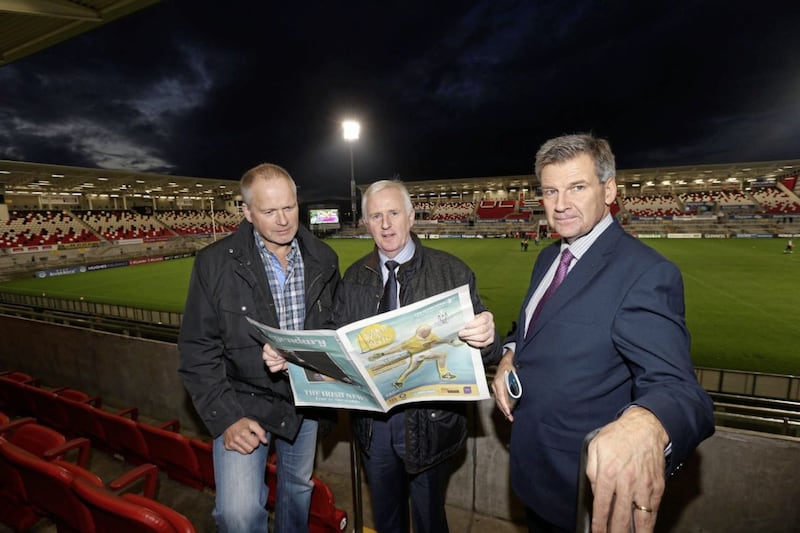THERE’S a story that Trevor Ringland likes to tell about hurling on the Belvoir Estate.
One of the most established loyalist strongholds in south Belfast, it was the kind of area that Michéal Ó Muircheartaigh would have placed alongside Fermanagh and Fiji.
Billy Tate was principal of the local primary school when one of his students approached him with a question.
“Sir, what’s the strange game they play down the road with the big stick?”
The answer wasn’t enough to sate the young boy’s thirst.
“Sir, can we try it?”
Billy Tate knew the territory. Introducing hurling was not the kind of move that could be attempted in an unsolicited way. And when he introduced the game to his young students, some parents were up in arms.
“I went on to a website and if you’d seen the abuse he was getting from certain people in the estate. It was pretty vicious,” says Ringland, taking up the story.
“I rang him and asked if there was anything I could do. He told me: ‘Don’t worry, I’ve spoken to the right people’.
“He had spoken to the loyalist paramilitaries. He must have bounced it off their leaders and they said go ahead.
“You have to see that as well: people were prepared to let go. As one loyalist paramilitary said to me, ‘Trevor I don’t want to have a relationship with those people. There’s too much history. But I want my children to have one’.”
He grew up as much a stranger to the GAA fields around Belfast as any other son of an RUC officer would have, but without the bitterness that can be entangled in such an existence.
The family managed to live a life relatively sheltered from the Troubles, owing largely to the protective influence of his parents, but it was impossible to be unaware of the sub-machine gun that was housed beneath his mother and father’s bed. It was impossible to be unaware of his father checking the car for booby traps every time he stepped into it.
When he was studying at Queen’s, the rugby, hockey and GAA teams all had degrees of success and so the sporting wing of the institution became intertwined. That broadened his horizons.
Still, his first real exposure to playing Gaelic games of any description came when he was in camp with the Ireland squad. On their tour of Japan in 1985, some players brought hurls and he had his first taste.
Later that year, the squad was invited to visit Vincent O’Brien’s stud farm. A game of Gaelic football was arranged against the local Fethard club.
“We went into the wee village beside the stud farm and we saw these signs up saying Irish rugby team versus the local team. We realised it was serious. Half the guys were injured and they were told they were playing.
“This huge crowd turned up. I thought I was doing well because the guy kept having to kick it over the bar! I eventually got fed up with this guy running past me and I rugby tackled him into the middle of the crowd, which got a big cheer.”
But he has always held an affinity for community ethos of the GAA's games and in recent years has been almost a lone unionist voice in standing up for the organisation.
In the end, his willingness to hold the olive branch across the divide brought down the curtain on his brief political career.
He resigned from the Ulster Unionist Party in 2010, where he held a position on the liberal wing, over then party leader Tom Elliot’s intransigence on the issue of attending a GAA game.
As someone who refuses to be compartmentalised – “I’m Irish, Northern Irish, British, and there are elements of the European culture to enjoy” – his outlook is that sport can be used to heal society’s cracks.
For the uninitiated, Ringland was a 1983 British and Irish Lion. He was a 31-times capped Irish international, Triple Crown winner, scorer of nine tries, as well as a veteran of Ulster and a long-serving player and coach with Ballymena.
As a player he proudly wore the green of Ireland and famously jokes that he united Ireland twice – once when he scored a try against England and both wings of the Maze prison cheered; and in 1988, when he allowed fresh England winger Chris Oti to score a hat-trick, uniting the country in calls of “he’s useless, get rid of him”.
There aren’t many UUP politicians, former or otherwise, that would know the words to Amhran na bhFiann in Irish. “It took Ginger McLoughlin three years to get it into my head.”
He stood proudly in Croke Park in February 2007, when Ireland met England at the venue in their historic Six Nations clash. The stains of Bloody Sunday in 1920 seemed cleansed as God Save The Queen rang out for the first time in the north Dublin venue.
Ringland sang it, just as he sang Amhran na bhFiann and Ireland’s Call that day.
In recent years he has been a key background figure in trying to break down society’s cultural and religious barriers through the medium of sport.
He has praise for the work that the GAA, the IFA and Ulster rugby have done in reaching across the divide, not least for the late Danny Murphy, who was a particular visionary in that respect.
The Game of Three Halves, an initiative that brings together youngsters from the interface areas of Belfast to play Gaelic football, rugby and soccer together, is something he would love to see rolled out to a wider audience.
“We’re standing watching kids from across the interfaces; kids from north Belfast against east Belfast against south Belfast against west Belfast; but it’s not one side against the other.
“North Belfast is the Shankill and the Falls playing together, taking on the others, and they’re cheering for each other.
“A TV crew were filming at Crusaders [in 2013], which they share with Newington, and they asked ‘what does a shared future look like?’ I just said: ‘Look, that’s it behind you.’
“We had their parents in the stand watching their kids participate. It’s not complicated stuff but when we get a chance to know each other, we realise we have a lot in common.”
*
AMOUR. The French word for ‘love’, ancestor of the word ‘amateur’.
For the love of it. That’s why he played rugby. That’s why they all did.
As he sits at the window in Established Coffee, just yards from the Talbot Street office where he was worked for more than two decades as a solicitor for Macauley & Ritchie, his playing career comes back into focus.
It’s a dank Friday afternoon in the heart of Belfast. One of the first things he is asked as he steps through the door is whether he misses the competitiveness of playing competitive rugby.
“I played my last game for Ballymena only a few years ago. They wouldn’t let me play on the wing so I played at scrum-half. It was great to see so much ball.”
When he toured New Zealand with the Lions in 1983, he was the only man making money from rugby.
As a solicitor’s apprentice, his wages were £35 a week. On tour, the players were given an allowance of £8-a-day, which added up to one-and-a-half times his weekly wage.
For him, it was more lucrative to be away from home for two months, where the tourists played 18 games but lost all four against the All Blacks in a series whitewash.
He would have toured with the Lions again in South Africa three years later had it not been for apartheid, and by the time the former Ballymena and Ulster winger returned to New Zealand with Ireland for the World Cup in 1987, the entire experience had changed.
“The experience we had [in 1983], the fun we had, the way we were received by the people of New Zealand was fantastic.
“They made sure everywhere we went, they wanted us to have the best time. In my life, you can’t put a value on it.
“The World Cup was a great event to be involved in but when you compare it to the Japanese tour or the New Zealand tour, the rewards for you in the round as a player weren’t there.
“You were there to play rugby, and everything else was very much secondary, which is understandable too.”
By that stage, the wheels were turning. The southern hemisphere, along with France, was driving standards to the point where amateurism was no longer viable.
It took until 1995, by which stage Ringland had retired, for World Rugby to eventually flick the switch.
What followed for Ireland was two-pronged. The Grand Slam in 2009, three Six Nations titles in the last eight years, four Triple Crowns in that time, it has undoubtedly been a profitable venture for the international game.
Ulster, Munster and Leinster have all won European Cups, while Connacht’s remarkable growth over the past few seasons has strengthened the provincial standing, though the modern fiscal power of the English Premiership and Top 14 present arguably the biggest challenge they have ever faced.
As a member of the IRFU committee, he played a role in the creation of the centralised contracts that now manage the players’ schedules in line with the needs of the international team above their provinces.
But at amateur level, the game has collapsed as a spectacle. Ringland played in an era when thousands would have turned out to watch Ballymena.
The Ireland players managed their own playing schedules because, as he puts it, “nobody owns you” when you’re amateur.
He turned down an invitation to play for the Barbarians against Scotland because he had a cup semi-final to play for Ballymena. He defied Ulster coach Jimmy Davidson, who told him not to play against an Ulster select at the opening of clubrooms at Newry, having been asked by his uncle.
“The fact that I got injured in the game didn’t help.”
Crowds at clubs games have dwindled to nothing. That is not what he would like to see but in a way, they’re performing their function by offering sport to those just doing it for the amour of it.
“To me, that was the beauty of the game. At one level, you play internationals but at the other, you played for your club and you had your loyalty to the club.
“One of the mistakes the clubs made was paying players as well, whether it’s others paying players to play for the club or the club themselves paying players.
“When we go went to our club matches, there were internationals and provincial players on all sides, and there were real competitions between players.
“It made for a better atmosphere and a vibrancy around the club. That’s unfortunately one of the losses coming out of professionalism.”
And the further down that road the GAA goes, the more fear grows that its club game will go the same.
The warning signs are visible. Recent headlines about the minimal lack of time inter-county footballers and hurlers are spending around their clubs act as the latest evidence of a move away from the community-orientated organisation that the GAA has always been.
The club game sadly no longer houses the sport’s best on a weekly basis. Clubs are lucky to have their players available for even a small fraction of their games.
“If you go down the financial route, you lose something, and you have to be very careful,” Ringland warns.
“Rugby has a tremendous ethos of friendship and camaraderie around it, and we have to ensure we don’t lose that ethos in the professional era. Certainly it’s under strain.
“In financial terms, and I’ve said this to members of the GAA down the years, once you down that route, you end up running your game to pay the players.
“They become such an overhead and once you start to pay them, it becomes like a pyramid. Every level you go down, you pay wider and wider groups.
“If you pay the players, the bagman says ‘why aren’t you paying me?’ and the coach says the same, the selectors, the referees are wanting paid.
“Gradually, all this money that used to flow into developing the game can flow into the pockets of players and others. You have to be very careful you don’t lose the ethos of your game.
”There’s a very strong community aspect to the GAA and a very strong volunteer aspect, and you could lose an awful lot of that going down the professional route.”
A voice of reason, in more ways than one.
